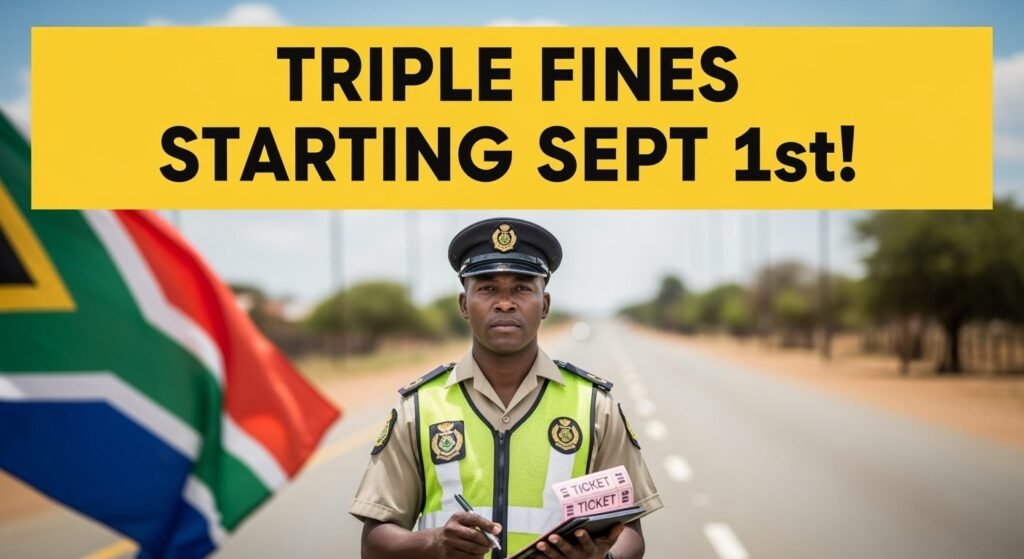South Africa traffic fines: If you’re a driver in South Africa, I’ve got some news that might make you think twice before pressing that accelerator pedal. This September, the country is set to implement a significant change to its road penalty system, with traffic fines potentially tripling in value. This dramatic increase is part of the government’s efforts to curb the alarming rate of road accidents and fatalities on South African roads. The new measures aim to create a stronger deterrent for those who might otherwise disregard traffic laws, but they’re also raising concerns among everyday motorists who worry about the financial impact these increased penalties might have. Are you prepared for these changes, and do you know what they might mean for your daily commute?

What Are The New Traffic Fine Increases?
The upcoming changes to South Africa traffic fines represent one of the most substantial increases in recent years. Starting this September, drivers can expect penalties to triple across various offenses. For instance, what might have previously resulted in a R500 fine could now set you back R1,500. These increases apply to a wide range of violations, from speeding and running red lights to driving without a seatbelt or using a mobile phone while behind the wheel. The authorities haven’t released a comprehensive list of all affected offenses yet, but the message is clear: the cost of breaking road rules is about to become significantly higher. I’ve noticed that these changes are particularly targeting high-risk behaviors that contribute to the country’s road fatality statistics.
Why Is South Africa Implementing These Changes?
The decision to triple traffic fines comes as a response to South Africa’s troubling road safety statistics. With one of the highest road fatality rates globally, authorities are under pressure to take decisive action. The existing fine structure, established years ago, has lost its deterrent effect due to inflation and changing economic conditions. By substantially increasing penalties, the government hopes to create a financial incentive strong enough to encourage compliance with traffic laws. Additionally, the revenue generated from these increased fines is expected to fund road safety initiatives and infrastructure improvements. But is hitting motorists’ wallets really the most effective way to change behavior? Many road safety experts argue that consistent enforcement matters more than the size of the penalty, while others maintain that truly significant consequences are necessary to break dangerous driving habits.
When Will These Changes Take Effect?
The implementation of the tripled South Africa traffic fines is scheduled for September 2023. This gives motorists a short window to adjust their driving habits before facing the heightened penalties. The rollout will be nationwide, affecting all nine provinces simultaneously, though local traffic departments may have some flexibility in how they phase in the new fine structure. Authorities have indicated that there will be an initial awareness campaign to inform drivers about the changes, but no grace period has been officially announced. This means that from day one of implementation, you could be subject to the full increased penalties. I recommend staying updated through official government communications and traffic department announcements as September approaches, as specific dates and details may be refined in the coming weeks.
How Will This Affect Everyday Drivers?
| Offense Type | Potential Impact |
|---|---|
| Speeding | Triple fines, possible license suspension |
| Mobile phone use | Significantly higher penalties |
| Seatbelt violations | Increased fines for all occupants |
The tripling of traffic fines will have far-reaching consequences for South African motorists. For the average driver, this means that even minor infractions could result in significant financial strain. Families operating on tight budgets may find themselves particularly vulnerable if they incur these new, higher penalties. Additionally, there could be knock-on effects for insurance premiums, as some providers consider traffic violations when calculating rates. On the positive side, if these measures succeed in reducing dangerous driving, all road users stand to benefit from safer conditions. I believe the true test will be whether these increased fines lead to actual behavioral changes or simply create additional financial burdens without addressing the root causes of road safety issues.
Real-World Impact: The Morning Commute Scenario
Consider this: You’re running late for an important meeting, driving 20 km/h over the speed limit on a main road in Johannesburg. Before September, this might have resulted in a R750 fine if caught. Under the new system, that same violation could cost you R2,250. For many South Africans earning an average salary, that represents a significant portion of their monthly income – potentially equivalent to a week’s wages or more. This stark reality illustrates why these increased penalties aren’t just a minor inconvenience but could represent a genuine financial crisis for many households. The authorities hope this very real consequence will make drivers think twice before breaking road rules, even when they’re in a hurry.



